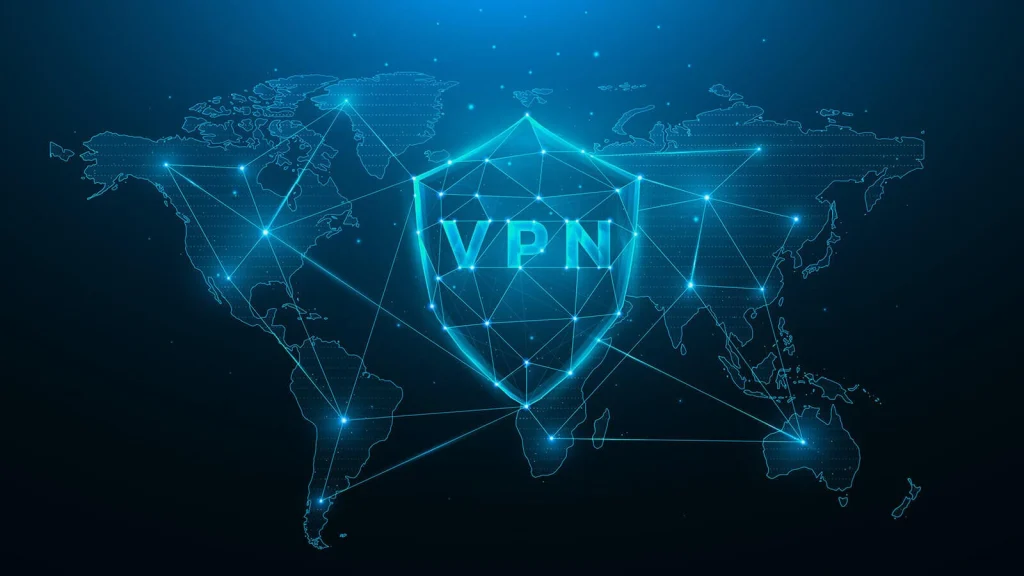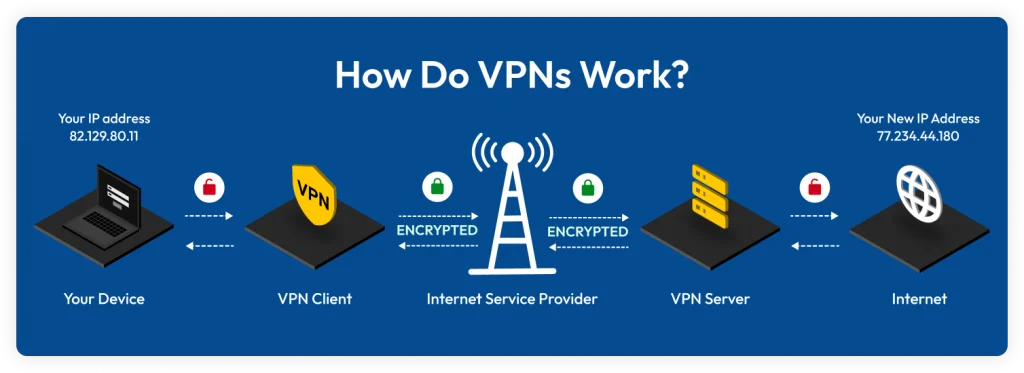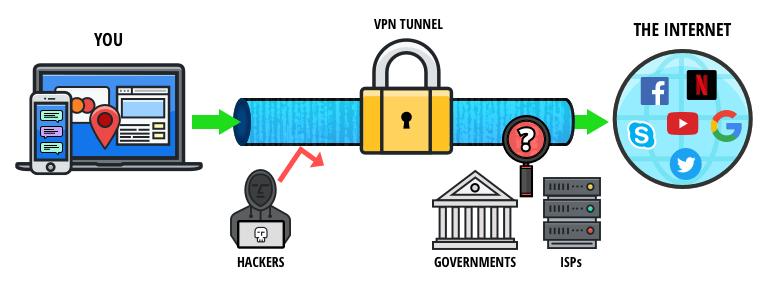In today’s digital world, privacy and security have become more important than ever. Whether you’re browsing the web at home, on a public Wi-Fi network, or working remotely, securing your online activity is essential. One of the best ways to protect your information is by using a VPN. But what exactly is a VPN, and why should you use one? In this article, we will explore these questions and explain the benefits of having a VPN in the modern digital age.
What is a VPN?
A Virtual Private Network (VPN) is a service that creates a secure, encrypted connection between your device (computer, smartphone, tablet) and the internet. It acts as a tunnel for your data, protecting it from hackers, spies, or anyone trying to monitor your online activities. VPNs are often used by businesses and individuals to safeguard sensitive data, especially when accessing the internet over unsecured networks, such as public Wi-Fi in cafes or airports.

How Does VPN Work?
When you use a VPN, your internet traffic is routed through a remote server, which hides your IP address and encrypts your data. This process ensures that your online actions remain private and your personal information is not easily accessed by unauthorized parties. The VPN server can be located in a different country, making it appear as though you are accessing the internet from that location rather than your actual geographic location.
This process includes two key elements:
- Encryption: This scrambles your data so that it cannot be read by anyone who intercepts it.
- Tunneling: Your data is sent through a secure ‘tunnel’ that prevents third parties from accessing it.

Why Do You Need a VPN?
In current IT era where data breaches, cyberattacks, and privacy violations are increasingly common, a VPN serves as an important tool for enhancing your online security and privacy. Let’s explore some of the top reasons why you should consider using a VPN.

1. Enhanced Online Privacy
One of the primary reasons people use a VPN is to protect their online privacy. When you browse the web without a VPN, your internet service provider (ISP) can track your online activity, including the websites you visit, the apps you use, and the time spent on them. Additionally, many websites collect your data through cookies, which can be used to build a profile for targeted advertising.
With a VPN, your online actions are hidden from your ISP, advertisers, and any other parties trying to monitor your activity. This is especially crucial if you’re concerned about your personal information being sold or exploited.
2. Protection on Public Wi-Fi Networks
Public Wi-Fi networks in places like coffee shops, airports, and hotels are often unencrypted, making them a prime target for cybercriminals. Hackers can easily intercept your internet connection on these networks, potentially stealing your personal information such as passwords, credit card numbers, or other sensitive data.
A VPN secures your connection on public Wi-Fi, ensuring that your data remains encrypted and private, even in high-risk environments. This makes it an essential tool for anyone who frequently uses public Wi-Fi.
3. Bypass Georestrictions and Censorship
Many websites and streaming services restrict content based on your geographic location. For example, some TV shows, movies, or websites may only be available in certain countries. A VPN allows you to bypass these geo-restrictions by masking your real IP address and making it appear as though you’re browsing from a different location.
This feature is particularly useful for accessing region-specific content on services like Netflix, Hulu, BBC iPlayer, and others. Additionally, a VPN can help you bypass censorship in countries where access to certain websites or social media platforms is restricted.
4. Safe Online Transactions
When making online purchases or managing your bank accounts, security is crucial. Without a VPN, your sensitive data, including payment details, can be intercepted by malicious actors during the transaction process. A VPN encrypts your data, adding an extra layer of protection to your online financial activities.
This is especially important if you’re accessing sensitive accounts or making purchases over public Wi-Fi networks, which are vulnerable to cyberattacks.
5. Preventing Tracking and Targeted Ads
Many websites and advertising networks track your online behavior to serve you targeted ads based on your browsing history. While this is common, it can also be intrusive and uncomfortable for users who want to maintain their privacy.
A VPN prevents advertisers and websites from tracking your online behavior by masking your real IP address. This means you can browse the internet without constantly being bombarded by ads tailored to your every move.
6. Avoid Price Discrimination
Did you know that online prices for products and services can vary based on your location? Many e-commerce websites adjust their pricing based on the country you’re browsing from, a practice known as price discrimination. A VPN can help you avoid this by making it appear as though you are browsing from a different location, potentially saving you money on online purchases.
Common Questions About VPNs
Is it Legal to Use a VPN?
In most countries, using a VPN is completely legal. However, some countries like China, Russia, and the UAE have strict regulations and even ban VPN usage in certain circumstances. Always research the laws of your country before using a VPN to ensure you’re complying with local regulations.
Do VPNs Slow Down Your Internet?
Using a VPN can sometimes slow down your internet speed because your data has to travel through an additional server and undergo encryption. However, modern VPN services typically offer fast and reliable connections, and you can minimize speed loss by choosing a VPN provider with servers close to your physical location.
Can I Trust Free VPNs?
While free VPNs might seem attractive, they often come with risks. Many free VPN services limit your data usage, have fewer server options, or might even track your activity for advertising purposes. For better security and privacy, it’s generally recommended to use a reputable paid VPN service.
Conclusion
In today’s interconnected world, a VPN is an invaluable tool for protecting your privacy, securing your data, and enhancing your online freedom. Whether you’re concerned about cyber threats, privacy invasions, or simply want to access restricted content, a VPN offers a simple yet effective solution. By using a VPN, you can browse the web with greater confidence, knowing that your data is secure and your online activities are private. With increasing concerns about digital security, investing in a VPN is an important step toward ensuring your online safety. If you want the best digital marketing services, click here.
Remarks
If you want to know about What is Meta AI in WhatsApp and how to use it then click here

